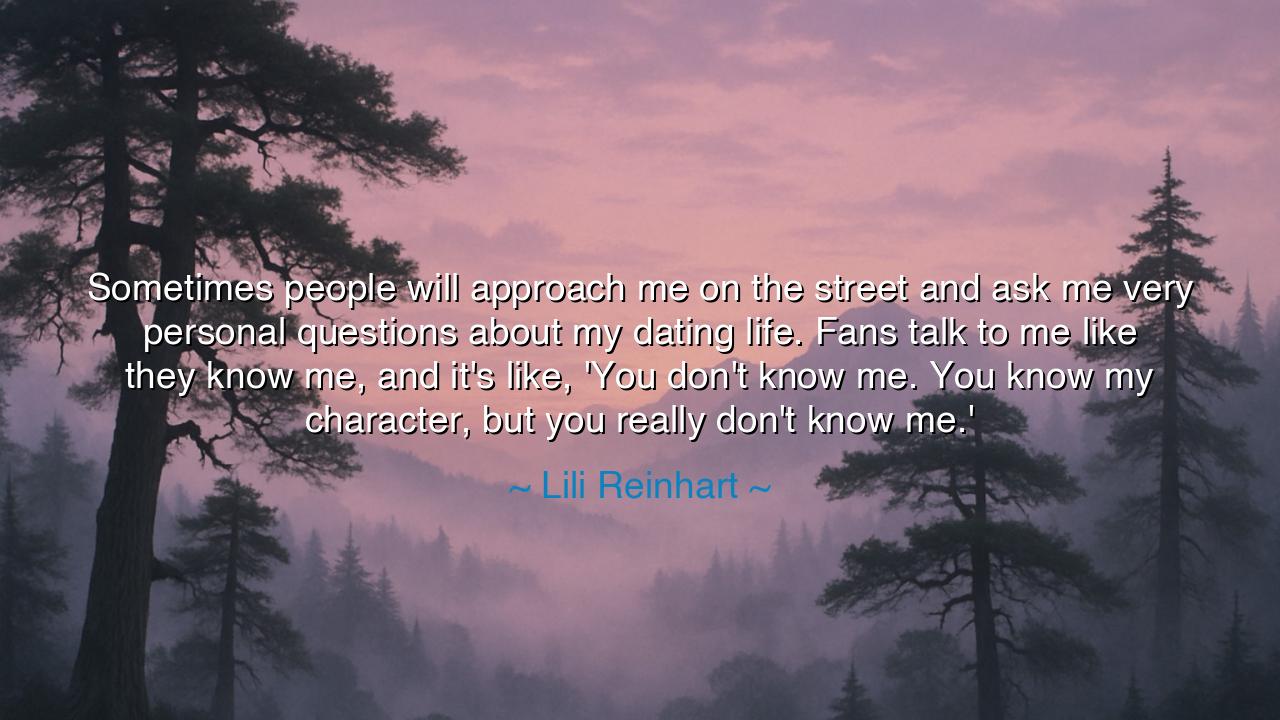
Sometimes people will approach me on the street and ask me very
Sometimes people will approach me on the street and ask me very personal questions about my dating life. Fans talk to me like they know me, and it's like, 'You don't know me. You know my character, but you really don't know me.'






Hear now the thoughtful and piercing words of Lili Reinhart, who said: “Sometimes people will approach me on the street and ask me very personal questions about my dating life. Fans talk to me like they know me, and it’s like, ‘You don’t know me. You know my character, but you really don’t know me.’” Beneath these words lies not only the lament of a young artist, but a truth as ancient as fame itself—the eternal divide between appearance and essence, between the mask the world sees and the soul that remains hidden. Her voice carries the weight of a thousand faces worn in public, and the longing for a self that belongs to no one but her own heart.
The origin of this saying lies in Reinhart’s life as an actress, known to many through her roles in film and television, where she gives breath to fictional lives that others come to love as though they were real. Yet in that love, a paradox arises: the audience, moved by emotion and story, begins to confuse the creation with the creator, the character with the woman. And so, she walks through the streets, meeting strangers who believe they know her—who mistake the mirror of performance for the reality of personhood. Her words are a plea for understanding, a quiet assertion that beneath the public image lives a private soul that deserves reverence and boundary.
The ancients, too, knew this duality. The Greek theatre, where actors first wore masks, gave birth to the very word “persona”—the “sound-through” mask of identity. To wear the mask was to step into a role, to speak for gods and heroes. But when the curtain fell, the actor returned to the ordinary world, his face his own again. Yet, as the centuries turned, the masks grew invisible, and men and women in the public eye found themselves trapped behind them. What was once a performance became a prison. So it is in the age of fame, when faces are known across the world, yet the person beneath is unseen. Reinhart’s lament is the modern echo of this ancient sorrow—the burden of those whose image is loved but whose truth is forgotten.
There is also a deeper lesson in her words: that knowing is not the same as seeing. To look upon a face on a screen, to follow a life through the shadows of media, is not to know the heart that beats behind it. The true knowing of a soul requires intimacy, patience, and empathy—gifts that cannot be demanded by strangers or assumed through illusion. In her protest, “You don’t know me,” Reinhart speaks not only for herself, but for all who have ever been misjudged, misunderstood, or mistaken for something they are not. She calls the world to remember that the image is but a reflection, not the essence; that admiration without understanding is but a mirage of love.
Consider the story of Marilyn Monroe, whose laughter lit up the world, yet whose heart was often shrouded in loneliness. To her admirers, she was the embodiment of glamour and desire; to herself, she was a woman seeking peace and sincerity in a world that only wanted her reflection. Like Reinhart, she too could have said, “You know my character, but you do not know me.” Her tragedy was not that she was unloved, but that she was loved falsely—adored for the illusion rather than the woman. Her story reminds us that fame, without understanding, is a gilded cage, and that even the brightest lights cast the darkest shadows.
And yet, Reinhart’s words do not speak only of sorrow—they also speak of self-knowledge and strength. To know where the character ends and the self begins is an act of courage in an age of confusion. She does not retreat from the world’s gaze; she simply claims the right to her own truth. In this, she teaches that boundaries are not barriers—they are shields for the soul. The artist must give, yes, but must also guard, lest she lose the center of who she is. This wisdom applies not only to those in fame’s glare, but to all who live in the public eye of others—each of us wears masks at work, in friendship, in society. Reinhart’s reminder calls us all to honor the self behind the mask, to protect what is sacred within.
So, children of tomorrow, take heed of this teaching: when you admire another, remember that what you see is but a facet of their being. Approach others not with assumption, but with curiosity and respect. Do not confuse performance with person, nor visibility with truth. And when the world demands that you become an image—when it hungers for your story before it has earned your trust—remember your right to say, as Lili Reinhart did, “You don’t know me.” Protect the mystery of your spirit, for it is from that mystery that authenticity and peace arise.
For in the end, her words are not a rejection of love, but an invitation to real understanding—to move beyond illusion into empathy, beyond fascination into friendship. The mask may charm, but only the unmasked heart can truly connect. And so, let this be your guide: see others not as roles, but as souls, and see yourself not as the world’s reflection, but as the truth behind it. In that sacred seeing lies the wisdom that turns admiration into compassion, and fame into fellowship.






AAdministratorAdministrator
Welcome, honored guests. Please leave a comment, we will respond soon